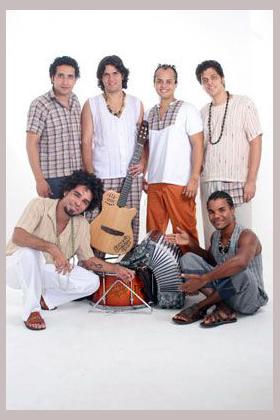 Cangaia de Jegue
Cangaia de Jegue
Cangaia de Jegue: A Musical Journey Through Feira de Mangaio
In the vibrant tapestry of Brazilian music, Cangaia de Jegue stands as a testament to the power of folk traditions and social commentary. With their signature song "Feira de Mangaio," the band has carved a unique niche in the realm of Northeastern forró.
Genesis and Roots:
Emerging from the rural heartland of Ceará in the 1980s, Cangaia de Jegue drew inspiration from the rhythms and melodies of their ancestors. Their name, translating to "Donkey Yoke," evokes the region's agricultural heritage and its struggles.
Members and Collaborations:
The band's core members include:
* Antônio José - vocals, guitar
* Alexandre Gonçalves - accordion, vocals
* Roberto Albuquerque - zabumba, vocals
Over the years, they have collaborated with renowned artists such as Geraldo Azevedo, Elba Ramalho, and Alceu Valença, enriching their sound with diverse influences.
Challenges and Controversies:
Cangaia de Jegue's music is not without its detractors. Their outspoken lyrics, which address social issues such as poverty, inequality, and environmental degradation, have drawn both praise and criticism.
In 2002, their album "A Turma do Mangue" was banned from radio airplay due to its controversial song "O Bode," which criticized corruption in politics. However, the band remained defiant, continuing to perform the song at live shows.
Musical Legacy:
Despite the challenges, Cangaia de Jegue's impact on Brazilian music is undeniable. Their innovative blend of traditional forró with elements of rock, samba, and reggae has inspired a new generation of musicians.
Discography:
The band has released several critically acclaimed albums, including:
* "Cangaia de Jegue" (1986)
* "O Grito do Sabiá" (1989)
* "A Turma do Mangue" (2002)
* "Viva Cangaia de Jegue" (2016)
Feira de Mangaio: An Ode to Tradition and Social Commentary
"Feira de Mangaio" stands as Cangaia de Jegue's most iconic song. Its lyrics paint a vivid picture of a bustling market, a microcosm of Northeast Brazil's cultural and social dynamics. The song's infectious beat and poignant storytelling have made it a beloved anthem of the region.
Conclusion:
Cangaia de Jegue's journey has been marked by both adversity and triumph. Their unwavering commitment to social commentary, combined with their musical brilliance, has cemented their place as one of the most influential bands in Brazilian music. Through their songs, they continue to inspire and provoke, reminding us of the power of music to challenge and unite.
In the vibrant tapestry of Brazilian music, Cangaia de Jegue stands as a testament to the power of folk traditions and social commentary. With their signature song "Feira de Mangaio," the band has carved a unique niche in the realm of Northeastern forró.
Genesis and Roots:
Emerging from the rural heartland of Ceará in the 1980s, Cangaia de Jegue drew inspiration from the rhythms and melodies of their ancestors. Their name, translating to "Donkey Yoke," evokes the region's agricultural heritage and its struggles.
Members and Collaborations:
The band's core members include:
* Antônio José - vocals, guitar
* Alexandre Gonçalves - accordion, vocals
* Roberto Albuquerque - zabumba, vocals
Over the years, they have collaborated with renowned artists such as Geraldo Azevedo, Elba Ramalho, and Alceu Valença, enriching their sound with diverse influences.
Challenges and Controversies:
Cangaia de Jegue's music is not without its detractors. Their outspoken lyrics, which address social issues such as poverty, inequality, and environmental degradation, have drawn both praise and criticism.
In 2002, their album "A Turma do Mangue" was banned from radio airplay due to its controversial song "O Bode," which criticized corruption in politics. However, the band remained defiant, continuing to perform the song at live shows.
Musical Legacy:
Despite the challenges, Cangaia de Jegue's impact on Brazilian music is undeniable. Their innovative blend of traditional forró with elements of rock, samba, and reggae has inspired a new generation of musicians.
Discography:
The band has released several critically acclaimed albums, including:
* "Cangaia de Jegue" (1986)
* "O Grito do Sabiá" (1989)
* "A Turma do Mangue" (2002)
* "Viva Cangaia de Jegue" (2016)
Feira de Mangaio: An Ode to Tradition and Social Commentary
"Feira de Mangaio" stands as Cangaia de Jegue's most iconic song. Its lyrics paint a vivid picture of a bustling market, a microcosm of Northeast Brazil's cultural and social dynamics. The song's infectious beat and poignant storytelling have made it a beloved anthem of the region.
Conclusion:
Cangaia de Jegue's journey has been marked by both adversity and triumph. Their unwavering commitment to social commentary, combined with their musical brilliance, has cemented their place as one of the most influential bands in Brazilian music. Through their songs, they continue to inspire and provoke, reminding us of the power of music to challenge and unite.